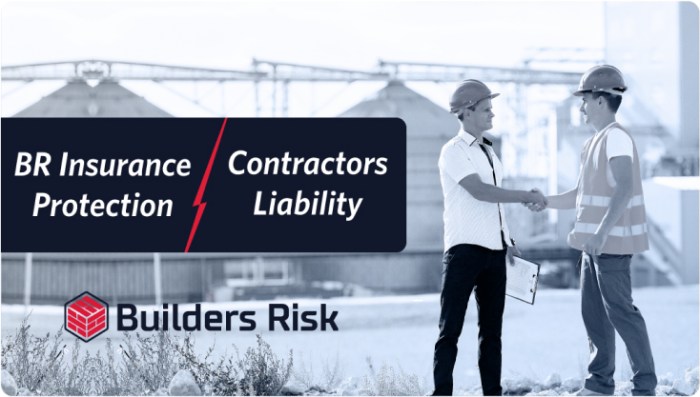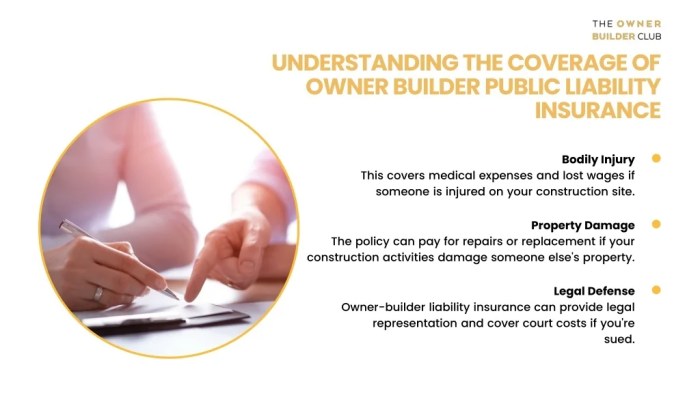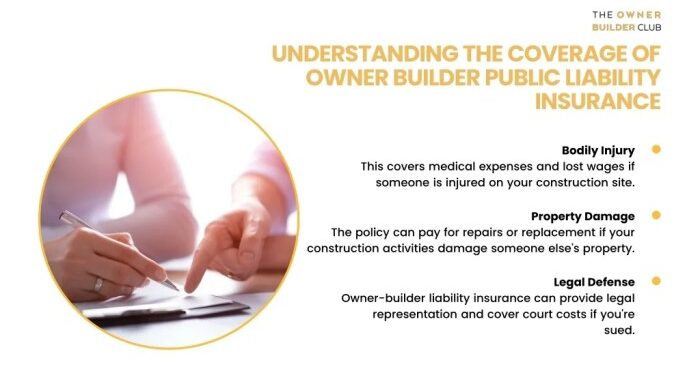Embarking on the journey of independent building projects comes with its own set of risks and challenges. One crucial aspect that often gets overlooked is the need for public liability protection. Let’s dive into what this protection entails and why it’s essential for independent builders.
Overview of Public Liability Protection for Independent Builders
Public liability protection is a type of insurance that provides coverage for independent builders in case they are held liable for property damage or bodily injury to a third party during the course of their work.
It is essential for independent builders to have public liability protection as it helps protect their business from potential financial losses resulting from lawsuits or claims made against them by clients, customers, or members of the public.
Importance of Public Liability Protection
- Protects against legal costs: Public liability insurance can help cover legal expenses in the event of a claim, including court costs and settlements.
- Provides peace of mind: Having public liability protection gives independent builders peace of mind knowing that they are financially protected in case of unforeseen accidents or incidents.
- Bolsters reputation: By having insurance in place, independent builders can demonstrate to potential clients that they are responsible and reliable professionals who take their work seriously.
Potential Risks Without Protection
- Financial losses: Without public liability protection, independent builders could face significant financial losses if they are sued for damages or injuries caused during their work.
- Lack of credibility: Operating without insurance may raise red flags for clients who may question the builder’s legitimacy and professionalism.
- Legal implications: In the absence of public liability coverage, independent builders may find themselves personally liable for damages, putting their personal assets at risk.
Coverage Details
Public liability protection for independent builders typically includes coverage for property damage, bodily injury, legal expenses, and advertising injury. This type of insurance is crucial for builders to protect themselves financially in case of any unforeseen accidents or incidents that may occur during their work.
Scenarios where coverage would come into play:
- If a builder accidentally damages a client’s property while working on a construction project, the insurance would cover the costs of repair or replacement.
- In the event that a third party is injured on the construction site due to the builder’s negligence, the insurance would cover medical expenses and legal fees.
- If a client accuses the builder of false advertising or copyright infringement related to their work, the insurance would cover the legal expenses involved in defending against such claims.
Comparison of different levels of coverage:
Independent builders can choose from different levels of coverage based on their specific needs and the risks associated with their work. Higher levels of coverage usually come with higher premiums but offer increased protection and peace of mind.
- Basic coverage: Provides essential protection for property damage and bodily injury, but may have limited coverage for legal expenses.
- Standard coverage: Offers more comprehensive protection, including coverage for legal expenses and advertising injury, at a slightly higher premium.
- Enhanced coverage: Provides the highest level of protection, with expanded coverage limits and additional benefits, making it ideal for builders working on large-scale projects or in high-risk environments.
Legal Requirements

Public liability protection for independent builders is not just a matter of choice; it is often a legal requirement in many jurisdictions. Builders are typically required to have public liability insurance to protect themselves, their clients, and the general public from accidents or damage that may occur during construction projects.
Examples of Legal Requirements
- In the UK, independent builders are legally obligated to have public liability insurance in place before undertaking any projects. This is to ensure that they can compensate for any injuries or property damage that may occur on the job.
- Similarly, in Australia, builders are required to have a minimum level of public liability coverage to comply with state regulatory bodies and local councils.
Case Studies
- A builder in the US who did not have public liability insurance was sued by a homeowner after a construction accident resulted in serious injuries. The lack of coverage led to a lengthy legal battle and significant financial strain on the builder.
- In Canada, an independent builder faced legal action from a neighboring property owner after a construction mishap caused damage to the adjacent building. Without public liability protection, the builder had to bear the costs of repairs and legal fees.
Importance of Compliance
- Complying with legal requirements for public liability protection can safeguard independent builders from costly legal disputes and financial liabilities in case of accidents or disputes.
- By having the necessary insurance coverage in place, builders can demonstrate their commitment to safety and professionalism, which can enhance their reputation and trustworthiness in the industry.
Cost and Providers
When it comes to public liability protection for independent builders, the cost can vary depending on several factors. Providers also have different terms and coverage options, making it essential for builders to compare and find the best fit for their needs.
Cost Factors
- Size of the business: Larger businesses may have higher premiums due to increased risk exposure.
- Type of work: Builders engaged in high-risk activities may face higher costs.
- Claims history: A history of claims can result in higher premiums.
- Coverage limits: Higher coverage limits will typically mean higher premiums.
Providers Comparison
| Provider | Terms |
|---|---|
| Provider A | Offers competitive rates for small businesses with comprehensive coverage. |
| Provider B | Specializes in coverage for high-risk activities but may come at a higher cost. |
| Provider C | Flexible terms and customizable coverage options for builders of all sizes. |
Tips for Finding Affordable Coverage
- Shop around and compare quotes from multiple providers to find the best price.
- Consider bundling your public liability protection with other insurance policies for potential discounts.
- Review your coverage needs regularly to ensure you’re not overpaying for unnecessary protection.
- Look for providers that offer discounts for claims-free periods or safety certifications.
Closing Summary

As we wrap up our discussion on public liability protection for independent builders, it’s clear that ensuring proper coverage is not just a legal requirement but a strategic move to safeguard your business. By understanding the risks, coverage details, legal implications, and cost factors, independent builders can navigate the construction landscape with confidence and peace of mind.
Quick FAQs
Is public liability protection mandatory for independent builders?
While it’s not legally required, having public liability protection is highly recommended to protect your business from potential liabilities.
What kind of scenarios are covered under public liability protection?
Public liability protection typically covers incidents where a third party suffers injury or property damage due to your work as an independent builder.
How can independent builders find affordable coverage?
Researching different providers, comparing their terms, and looking for comprehensive yet cost-effective packages can help independent builders find affordable coverage.



